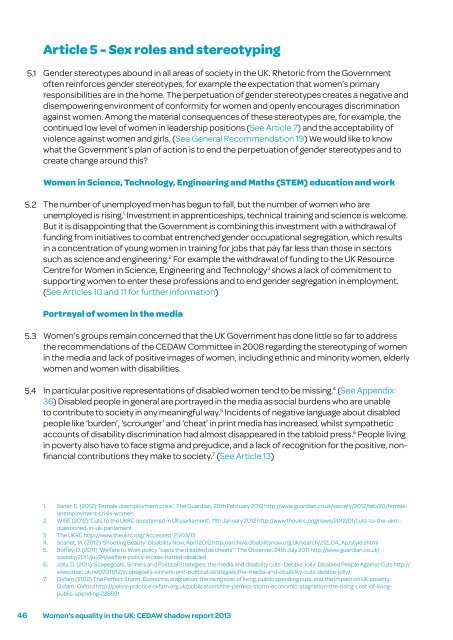Women’s equality in the UK – A health check
Women’s equality in the UK – A health check
Women’s equality in the UK – A health check
You also want an ePaper? Increase the reach of your titles
YUMPU automatically turns print PDFs into web optimized ePapers that Google loves.
5.1<br />
5.2<br />
5.3<br />
5.4<br />
Article 5 - Sex roles and stereotyp<strong>in</strong>g<br />
Gender stereotypes abound <strong>in</strong> all areas of society <strong>in</strong> <strong>the</strong> <strong>UK</strong>. Rhetoric from <strong>the</strong> Government<br />
often re<strong>in</strong>forces gender stereotypes, for example <strong>the</strong> expectation that women’s primary<br />
responsibilities are <strong>in</strong> <strong>the</strong> home. The perpetuation of gender stereotypes creates a negative and<br />
disempower<strong>in</strong>g environment of conformity for women and openly encourages discrim<strong>in</strong>ation<br />
aga<strong>in</strong>st women. Among <strong>the</strong> material consequences of <strong>the</strong>se stereotypes are, for example, <strong>the</strong><br />
cont<strong>in</strong>ued low level of women <strong>in</strong> leadership positions (See Article 7) and <strong>the</strong> acceptability of<br />
violence aga<strong>in</strong>st women and girls. (See General Recommendation 19) We would like to know<br />
what <strong>the</strong> Government’s plan of action is to end <strong>the</strong> perpetuation of gender stereotypes and to<br />
create change around this?<br />
Women <strong>in</strong> Science, Technology, Eng<strong>in</strong>eer<strong>in</strong>g and Maths (STEM) education and work<br />
The number of unemployed men has begun to fall, but <strong>the</strong> number of women who are<br />
unemployed is ris<strong>in</strong>g. 1 Investment <strong>in</strong> apprenticeships, technical tra<strong>in</strong><strong>in</strong>g and science is welcome.<br />
But it is disappo<strong>in</strong>t<strong>in</strong>g that <strong>the</strong> Government is comb<strong>in</strong><strong>in</strong>g this <strong>in</strong>vestment with a withdrawal of<br />
fund<strong>in</strong>g from <strong>in</strong>itiatives to combat entrenched gender occupational segregation, which results<br />
<strong>in</strong> a concentration of young women <strong>in</strong> tra<strong>in</strong><strong>in</strong>g for jobs that pay far less than those <strong>in</strong> sectors<br />
such as science and eng<strong>in</strong>eer<strong>in</strong>g. 2 For example <strong>the</strong> withdrawal of fund<strong>in</strong>g to <strong>the</strong> <strong>UK</strong> Resource<br />
Centre for Women <strong>in</strong> Science, Eng<strong>in</strong>eer<strong>in</strong>g and Technology 3 shows a lack of commitment to<br />
support<strong>in</strong>g women to enter <strong>the</strong>se professions and to end gender segregation <strong>in</strong> employment.<br />
(See Articles 10 and 11 for fur<strong>the</strong>r <strong>in</strong>formation)<br />
Portrayal of women <strong>in</strong> <strong>the</strong> media<br />
<strong>Women’s</strong> groups rema<strong>in</strong> concerned that <strong>the</strong> <strong>UK</strong> Government has done little so far to address<br />
<strong>the</strong> recommendations of <strong>the</strong> CEDAW Committee <strong>in</strong> 2008 regard<strong>in</strong>g <strong>the</strong> stereotyp<strong>in</strong>g of women<br />
<strong>in</strong> <strong>the</strong> media and lack of positive images of women, <strong>in</strong>clud<strong>in</strong>g ethnic and m<strong>in</strong>ority women, elderly<br />
women and women with disabilities.<br />
In particular positive representations of disabled women tend to be miss<strong>in</strong>g. 4 (See Appendix:<br />
36) Disabled people <strong>in</strong> general are portrayed <strong>in</strong> <strong>the</strong> media as social burdens who are unable<br />
to contribute to society <strong>in</strong> any mean<strong>in</strong>gful way. 5 Incidents of negative language about disabled<br />
people like ‘burden’, ‘scrounger’ and ‘cheat’ <strong>in</strong> pr<strong>in</strong>t media has <strong>in</strong>creased, whilst sympa<strong>the</strong>tic<br />
accounts of disability discrim<strong>in</strong>ation had almost disappeared <strong>in</strong> <strong>the</strong> tabloid press. 6 People liv<strong>in</strong>g<br />
<strong>in</strong> poverty also have to face stigma and prejudice, and a lack of recognition for <strong>the</strong> positive, nonf<strong>in</strong>ancial<br />
contributions <strong>the</strong>y make to society. 7 (See Article 13)<br />
1. Saner, E. (2012) ‘Female unemployment crisis’, The Guardian, 20th February 2012 http://www.guardian.co.uk/society/2012/feb/20/femaleunemployment-crisis-women<br />
2. WISE (2012) ‘Cuts to <strong>the</strong> <strong>UK</strong>RC questioned <strong>in</strong> <strong>UK</strong> parliament’, 11th January 2012 http://www.<strong>the</strong>ukrc.org/news/2012/01/cuts-to-<strong>the</strong>-ukrcquestioned-<strong>in</strong>-uk-parliament<br />
3. The <strong>UK</strong>RC http://www.<strong>the</strong>ukrc.org/ Accessed: 21/03/13<br />
4. Scarlet, M. (2012) ‘Shoot<strong>in</strong>g Beauty’ Disability Now, April 2012 http://archive.disabilitynow.org.uk/search/z12_04_Ap/style.shtml<br />
5. Boffey, D. (2011) ‘Welfare to Work policy “casts <strong>the</strong> disabled as cheats”’ The Observer, 24th July 2011 http://www.guardian.co.uk/<br />
society/2011/jul/24/welfare-policy-<strong>in</strong>cites-hatred-disabled<br />
6. Jolly, D. (2011) ‘Scapegoats, S<strong>in</strong>ners and Political Strategies: <strong>the</strong> media and disability cuts -Debbie Jolly’ Disabled People Aga<strong>in</strong>st Cuts http://<br />
www.dpac.uk.net/2011/12/scapegoats-s<strong>in</strong>ners-and-political-strategies-<strong>the</strong>-media-and-disability-cuts-debbie-jolly/<br />
7. Oxfam (2012) The Perfect Storm: Economic stagnation, <strong>the</strong> ris<strong>in</strong>g cost of liv<strong>in</strong>g, public spend<strong>in</strong>g cuts, and <strong>the</strong> impact on <strong>UK</strong> poverty.<br />
Oxfam: Oxford http://policy-practice.oxfam.org.uk/publications/<strong>the</strong>-perfect-storm-economic-stagnation-<strong>the</strong>-ris<strong>in</strong>g-cost-of-liv<strong>in</strong>gpublic-spend<strong>in</strong>g-228591<br />
46 <strong>Women’s</strong> <strong>equality</strong> <strong>in</strong> <strong>the</strong> <strong>UK</strong>: CEDAW shadow report 2013


